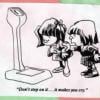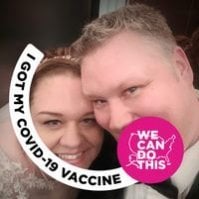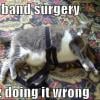Search the Community
Showing results for 'alcohol'.
Found 17,501 results
-


No added sugar cordial ?
QueenOfTheTamazons replied to msfaybe's topic in Gastric Bypass Surgery Forums
A cordial is not going to be a low glycemic index drink. Also, I didnt say that she was going to become an alcoholic. Transfer addictions can be alcohol, drugs, cigarettes, exercising, gambling, shopping etc. If she is newly post op and judging by the question its likely, and already asking about alcohol she can be opening herself up to a slippery slope. If nothing else, like for me, drinking can lead to noshing and then full out Taco Bell binges. HW 385 SW 359 CW 338 Sleeved 10/5/16 -


I Realize I Need A Support Group
Noelani commented on chezhollywood51's blog entry in chezhollywood51's Blog
sorry, I dont know what happend but I will continue with my comments to you. I have realized over the last 2 years that food will probably always be an issue for me just as a diabetic deals with constant issues regarding carbohydrates. I somehow hope that I can come to terms with my issue though realistically I believe that I will never be able to go back to pre-band days because I have an addiction to overeating - just like my husband will never be able to drink again because he is an alcoholic. So for me, and maybe for you as well, we somehow need to be able to come to terms with our food addiction and be ok with the fact that we had a problem and now we have a tool to help remind us ( afterall, if I overeat the consequence is throwing up and I don't like that). There are times when I push myself but those times are rare. It seems that you are moving in the right direction by searching within yourself and not living in denial about the food issues. Over time, maybe we can remove the "food" as you mentioned in your blog and perhaps we can be cured? until then, I try to take each day at a time along with reminding myself that this has been one of the toughest decisions I have made ( choosing to have the lap band) because it has taken away one of the most enjoyable aspects of my life ( eating whatever I wanted). I have grieved on many occasions for the life that use to be with food and this is hard for non-lap band people to understand. I wake up each morning with a smile on my face knowing that i can face the day with being depressed about being fat -wow, what a difference that has made in my life that I would never want to give up. Hope this helps, this is the first time I have shared my feelings with anyone because my husband is the only one that knows about my lap-band, I have always been too ashamed to share it with anyone else ( my issue). Take care, Noelani -
just one other thing i forgot to mention dr. gabriel did not adequately prepare me for surgery. You are not suppossed to drink 6 weeks prior to. I saw this on the pre-op paperwork 11/2 weeks before my surgery during an office visit. I told him i had alot of parties that weekend and would be drinking alcohol, He did not tell me not to . He said start pre-op diet 1 week prior to surgery which was the following Mon.
-


Not affected by alcohol
The Greater Fool replied to LAJ23's topic in POST-Operation Weight Loss Surgery Q&A
Would so many sips have affected you pre-op? The sleeve wouldn't necessarily cause alcohol to have a different than normal impact on you post-op as pre op. You still have a pyloric valve, which is the gatekeeper between your stomach and your (normal) intestines. Early post op since you aren't eating as much alcohol might have a slightly greater than normal impact, just as if you were drinking on a nearly empty stomach. The sleeve creates restriction on what you can eat. It really doesn't change digestion. Good luck, Tek -
@Ylime probably a bit more prone to scratching as it doesn't have the flush face, I got the rose gold and lavender special edition and when the band gets dingy I can just scrub it with soap and a nail brush and get it new looking. I have gotten it muddy gardening and just cleaned the back off with alcohol wipes and it was fine.
-
Having this surgery leaves you vulnerable to death by alcohol poisoning . Think alcohol enema . Be careful , just sayin.
-
I, too, became an alcoholic post-RNY. I am five days into my second detox. I went to an AA meeting today and realized they way they talk about craving alcohol is exactly how I used to crave food. I don't crave alcohol in the same way. I wouldn't even call it a crave. I use it to self medicate when I have anxiety, just as I used to use food. After I stabilize, my doc and I are going to look at changing my anti-anxiety meds because, clearly, the ones I'm on now are not doing the trick. Until then, I am keeping very busy with my hobbies and work to keep my anxiety down. I'm going to have a fantastic garden this year. 🙂
-
I found this on another support group site; I thought it was very informative and thought I'd share. (I just copied and pasted below) 1.Things I wish I'd known, part 1 These thoughts on "things I wish I'd known" were compiled by Lisa M on thinnertimesforum.com. Originally compiled in 2007, the "thoughts" were updated in 2010. They all come from people who have "been there, done that." Though the post is lengthy, I encourage you to read through to the end. There is much to discover here; comfort and company, hope and inspiration. Here are LisaM's notes on her efforts: "I gathered these off a thread that we had on here around about four years ago, took off everyone's names, added where the person was post-op, and put them in order by how far post-op the person was, so you can see how things change as we move further away from the surgery... If you have anything to add that you don't see here that you wish you'd known, please add to the bottom of the thread. If you recognize yourself in these words, has anything changed?" . . . . . . . . . . . . . Things I wish I’d known: Post-op less than one month: Gas pain gas pain gas pain!!! (one day post-op) • how hard it would be to eat and get the Protein in. • how hard it is to drink constantly. • what types of pain I really would go through. • what types of pain were "normal". • what type of protein I would be able to handle in the liquid stage (at this point, not much). (one week post-op) As stupid as it sounds, I wish I had known that getting the staples out was going to be more painful than anything I had been dealing with in about a week. And that the catheter was going to be such a pain to get out. Not painful; difficult... It took more time and energy to find somewhere/someone to take it out than I had energy-level wise. How annoying... (two weeks post-op) I thought I would have no appetite, but I do once I get through the morning sickness stage of my day. I didn't believe anyone when they said they couldn't tolerate Water - I am one of those people. (three weeks post-op) Post-op one month: I wish that I knew how truly hard it is to eat!! I am not hungry and it is very hard to get in all the protein that my body needs. Not only is it hard to get all the protein in, when I do eat I feel guilty. Hello!!! I know I shouldn't feel guilty, I am barely getting in 500 calories a day...but somewhere in my brain when I am eating (no matter what it is) I feel like I am being "bad". I was shocked at the post operative pain I personally went through - for about a week. It was hell on earth & I cried & swore every day about what I had done to myself. Maybe I am a wimp & have a low pain threshold but even so, there should be stronger analgesia on offer to those of us that are wimps. I also wish I'd been warned how emotional I'd be too & that sticking to fluids only is psychologically very difficult; if you used to be a "foodie". I wish I'd known how tired & weak I would be, just having a shower would exhaust me in the early days & I'd have to have a rest! At nearly a month out I'm starting to feel better about why I had the surgery, the weight is melting away & I feel better physically every day. Also at last the pain is practically gone. I'm taking note of all the other advice for later in my journey & I am looking forward to more energy in a few months & a sense o*******n when I get to my 100lb down mark. I'm also buying clothes on ebay as I've dropped two sizes already. As a guy, I really wish I had known about the catheter beforehand... as I was coming out of the anesthesia, I reached down to scratch myself and had a giant wtf moment because I wasn't expecting it. I wish I had know that six weeks post op and 35 lbs lost, and no one has noticed anything except that my face looks thinner and my boobs are smaller!! Post-op two months: I wish I understood what a challenge taking pills would be...at least at the beginning, and how all-consuming the transition is until it becomes 'just life.' I wish I’d known how getting hit on for the first time in my adult life would make me more insecure about my new (emerging) body.. not less. Post-op three months: I wish I’d known that: • Its hard to get in all the food you are supposed to every day. • Some days are easier than others. • How emotional you are when you get home. • Why your pouch is happy one day and not the next. • Plateaus.......need I say more! • That my co-workers are MORE supportive than I thought. • That I would show my scar off to people all the time - I am proud of it. • How the smell of some food turns you right off. • That there are many different rules from doctors.....and it’s ok, they are all correct. ... How much i would really miss food early out. It was crushing to not be able to run to the fridge and drown my sorrows and pain in a pint of Ben n Jerrys. ... How much i actually thought about food! I didn’t understand why i was so obese, i honestly thought i ate pretty well most of the time. ... What a pain in the butt it is to sip sip sip sip sip sip liquids ALLLL day. ... How weird it is to "eat" dinner with your family without shoveling it in like everyone else. ... Having people that don’t know you have had the surgery assume you’re becoming deathly ill or suddenly anorexic. ... How completely amazing it feels to be at the same weight I was when i got married 8 years ago and know that I could be at a high school weight by Christmas!! ... How weird it would be to look in the mirror and finally see the person i thought i was all this time emerging from the layers. i wish i knew how many times i'd stall! (like every 3rd week) and that every BODY is different, that at 3 months i'd only lost 40 pounds......... Post-op four months: I wish I had known how obsessed I would become with my weight and my appearance. Pre-surgery I was aware of how fat I was I just didn't dwell on it. As long as I was clean and semi-presentable I was fine. Now I find myself super conscious of everything I wear, every pound I lose and obsessing on how I can lose more weight in the fastest amount of time. Now I have to have pedicures, manicures, and my hair done. I feel uncomfortable without make up. I thought losing weight would make me more comfortable with my appearance and instead it has made me more self-conscious. Who knew! I wish I understood how EVERY aspect of my life would change dramatically. I wish I understood how tremendously happy I would be. I wish I understood how for me... the benefits far outweighed the risks. I wish I understood how many beautiful people I'd meet, and how much they would add to my life. I wish I understood how committed I would be, how strong I would be, and how wonderful I'd feel. I wish I understood that I needed to do this a long time ago. 1.Things I wish I'd known, part 2 of 3 Post-op five months: I wish I'd known how REALLY IMPORTANT it is to get enough protein! Yes, my doctor and my dietician both told me that, but I'd never eaten a lot of protein, so for some reason I just assumed I'd be OK if I didn't get as much as they said. Well, I got really sick. I was totally exhausted and throwing up constantly. I lost a LOT of hair. I developed pneumonia shortly after my surgery, and it took me forever to recover, I think because I wasn't getting adequate protein. I was in the hospital with the pneumonia for three weeks, and when I came home I was so weak I could hardly stand. I am proud to say that I am now getting about 75 grams of protein a day and feeling much, much better, but I wish I had known in the beginning how very important it was and what could happen if I didn't do it. I wish I'd known how quickly you'd forget about the early stuff; pain, weakness, exhaustion & struggling with only drinking fluids for a month. It's horrible I know but it will pass believe me & is soooo worth it. I'm now so fit I go to the gym every day for approx' an hour and a half, I'm lifting really big weights three times a week, I can do 90 mins of cardio work when not doing a class & I love it (I can even jog now for 15 mins). Post-op six months: I wish I'd have known not to sink so much money into protein supplements! I do kinda wish I'd have done it in my younger years, but then again, I think timing and such is part of our great plan for our life. I wouldn't want to alter who I was supposed to be and what I needed to learn by my experiences. But it would have been so cool to be thinner and still be a young thing! I wish I had known just how emotionally tough this journey is. No matter how much research, how many questions, how many support groups, or even what the Doctor & NUT tell you. I was still not fully prepared for just how emotionally and mentally hard WLS is. Until you are on the path, you really can not know what it will be like for you or how you will feel or what parts of your everyday life will be impacted. The journey is as individual as we are. Post-op seven months: I wish I had known how bad I would feel not being able to help my daughters lose weight. I have this great tool and I try to lead by example, but you all know how hard it is without the tool. On the other hand: I wish I had know how good it would feel to wear whatever I want and know I look good in it. Sometimes when I am out I have to remind myself that I am small! I was well aware of the known possibles, the published ones, the one your doc and NUT tell you about, but had I known about the myriad of problems others have had, the decision to go forward would have been even more difficult.... and I say that because I have not had many problems, nor difficulties in getting my protein in, nor wicked hair loss, nor constant dumping, nor hydration difficulties. I think my obstacles have been manageable, and overcome... which is how I treat obstacles... just a minor roadblock that you have to get through -- Such is life. I like that I recovered quickly from having an open RNY. I liked seeing 299 again, which kept me going. I like the support I received from professionals and friends. I like the friends I've made post WLS. I like the fact that I had not met anyone who had anything negative to say to me about having had WLS. I especially like the fact that I do not weigh 400 lbs, because had I not had WLS, that's where I'd be tipping the scale. So to me, this was worse than any negative that could be presented to me. Post-op eight months: --I wish I had known how much I enjoy working out regularly now that I am getting such great results for myself and such wonderful feedback from people who seem almost mesmerized about how different (read: "good") I now look having lost 16" in my waist and well over 100lbs so far this year! I wish I would have understood how losing weight would affect my relationships with other people. I wish I would have known that eating and drinking were going to become a full time job. The planning and weighing the grocery shopping and reading labels on everything you buy. I wish I would have known how difficult it was going to be to answer the same questions from people daily after surgery: How much have you lost? What did you eat today? Is that a new shirt? Did you get your water and exercise in today? I wish I would have been told how rough this surgery is mentally. The physical and mental changes that your body goes through are unbelievable. It is way more then just "losing weight". And the biggest one for me is that I never understood how hard it was going to be to say good bye to my best friend in the whole world. FOOD! It was there for me for any emotion or feeling that I had. It is like a death in the family not being able to rely on it or use it anymore. I wish I knew that I would be thinking about food constantly throughout my day. Food is on my mind now more than it was when I was 265 pounds! I wish I knew that I would be disappointed in myself for "only" having lost 70 pounds. I think if I hadn't had the surgery and lost 70 pounds I would be jumping for joy but now I can't help but feel somewhat unsuccessful. I wish I knew I would feel guilty for eating certain things even though its nowhere near the amount I used to eat (i.e. a cookie...) I wish I knew that my butt and my chest were going to become flat and my hair was going to fall out so much. I wish I knew how overwhelming shopping can be when you're not limited to the "Lane Bryants" of the world. Post-op nine months: That at 9+ months out you REALLY have to work at eating correctly... you CAN eat more and you DO have the old cravings. I did know this before surgery...I knew this during months 1-9...but I thought to myself, "nope, not me...I am going to be one of the ones that is never hungry...that never wants to eat" YEAH RIGHT! What a dork I am...It has just in the past few weeks become such a job to eat correctly and not eat crap. Post-op eleven months: I wish I had known that I am NOT truly that big boned......and therefore know not to overbuy clothes when I get to the limit my mind had made. Yep, a whole bag of my "never can imagine" size barely worn if at all, and hanging in the closet are the clothes in my "shut up......I would never be THAT small" size! I wish I had known that my tastes would change and make some of the healthy eating aspects easier than I imagined. I wish I had known that I would still somehow miraculously be able to consume mammoth amounts of salty munchies......which makes some aspects of my new life more difficult than imagined. I wish I had known not to overbuy the supplements, but rather to stock up on tea, cocoa powder, and dry milk. I wish I had known that I was not saying good-bye to food, but just setting new boundaries in our relationship. I wish I had known that I would like my body more and more with clothes on and less and less naked as I get smaller. I know it sounds silly but I wish I would have known just how chapped my lips were going to be! I also was not prepared for thinking "WHAT have I done to myself....... I must be stupid and crazy!!!!" It only lasted a day or two but I had no idea that others had this same thought! I felt as if I made a mistake and got extremely depressed. Even the next day I didn't feel that way I was excited for my journey! One year post-op: I wish that I realized how difficult "head hunger" was going to be for the first few months post op. I kept hearing about the fact that although I would be on a restricted diet, the DESIRE to eat "regular" food was going to be nearly insatiable. I couldn't eat like a normal person and I knew that, but I wanted to so bad. The mental changes that you go through to change the way you think and feel about food is a slow, phased and sometimes painful (but necessary) process. I did not understand that pre-op. I kept thinking I could deal with it without any problems at all and I was wrong. I also wished I listened to people tell me that I should not buy any new clothes (except for thrift or deeply discounted****il I was ALL THE WAY down to my new weight. Along the way, I kept thinking that was the smallest I could get, so I may as well get new clothes. I got a little wear out of the in-between sizes, but not much. I wish I had known the REAL reason why I was doing it - which had nothing to do with losing weight, but was about reclaiming my life. I wish I had known that the way I felt the first month post-op was temporary. Maybe it was better that I went in not knowing how truly awful I was going to feel for a while. Looking back on it, it passed quickly, but they don't call it hell week for nothing. I wish I had known how amazing it is to meet people who haven't seen me since before the surgery. I wish I had known that my life would change so much so fast. I love who I am for the first time in decades, and glory in the ability of this body to do so much without pain or tears or humiliation. I wi****ruly understood the COMMITMENT...100% life style change....they told me but real life is different from a zerox handout/support group once a month. I regret I had it. It is very dangerous. We never hear of those who died from Wernicke's encephalopathy, and other issues, as they are not considered by-pass related, "directly". I have Wernicke's encephalopathy, severe dry eye, ataxia, night sensitivity, and cannot keep weight on. I regret I had the surgery. Deeply regret it. I aged some 15 years. Hair is all but gone. And I am 1 year out. I would've taken the couples counseling sessions more seriously or read more into the dramatic effects it can and will have on your marriage/relationship post surgery. If you don't think it can happen to you, like I thought about my marriage, DO IT!! It will be worth it in the end and the "spouse support" is a major factor when talking of the TOTAL success of your surgery (other than the weight loss figures). 1.Things I wish I'd known, part 3 of 3 14 months: I wish I’d known: 1. that smells are so much stronger now and can make you ill 2. that skin is not always so elastic when it's going down as it was going up in weight 3. that your relationships change so much because you change, not just physically but emotionally. You have to deal with the issues you stuffed down your mouth, so the rawness of that can be hard to swallow 4. people don't always think you look good 5. some people like you better fat and don't know how to deal with you skinny 6. you really could lose your life and surgery is a huge step! I was so lucky my doc was a good one and fixed me up quick 7. How eating is a chore sometimes and you won't be hungry for food some days 8. people will think you are sick "all" the time even if it only happened 4 times in 9 months 9. that you won't see the changes as fast as some other people see them so you can get discouraged when you haven't lost as much weight as so n so 10. that the people who were attracted to you when you were fat, may not be attracted to you skinny 11. people who wouldn't look at you before, now have an interest in you 12. family can ignore your accomplishments because they are jealous or resent you took a chance on your life 13. that it would give me back my life such as playing, running, jumping, stretching, walking, etc... 14. fitting into clothes you haven't ever dreamed you would is such a HIGH!! 15. that WLS can be lonely if you don't have support 18 months: I wish I had trusted my fellow gbs friends when they said "Don't buy too many clothes...you will shrink out of them" I never believed I would ever be the size I am today. I was at 185, but I let a remark throw me off. Someone said " Oh God, your cheeks are all sunk in, you look terrible". So I purposely gained 35 lbs. regretting it now. I am dieting again to get back to 185. That is where I have no gut, naturally. Other wise, I lost 175 lbs...So, don't let a remark get to you. 20 months: Know that though Moderation is the long term goal for post op life... using 'living life with moderation' as an excuse to go off the post op plan before maintenance is unwise... active weight loss stops, and sometimes you cannot control how early it will stop or how much (or how little!) you will lose so it's wise to take that very short time (in the grand scheme of things) to stick as closely to your doctors plan as possible.. work that honeymoon phase and work it hard.. the more you lose towards your goal in that active weight loss plan the better. Take it from one whose weight loss stopped at 9 months and doctor after doctor has informed me that this is it, even though I still measure and log my food at nearly three years out and even though I work out a minimum of 10 hours a week at the gym.. and these aren't pansy workouts at a leisurely pace either.. random people come up to me and tell me how inspirational I am to them because they see how hard I work.. 'energizer bunny' at the gym is one label I'm proud to wear for sure.. 20 year olds have told me they feel intimidated because they can't keep up with me. And I'm still 'done'. And I am still classified as "Obese" on the BMI chart. I don't want any of you to end up like me. Though some days it messes with my head.. a LOT.. to see people years later, have surgery and then pass me by on the weight stats.. but it is still gratifying to me for the most part... if it wasn't, I wouldn't bother talking about the problem some of us have. And yeah, not all of us have this issue but you won't know till you're there, you know? :/ Two years: I wish I’d known that it would become a daily struggle for me to keep on track. I was told it gets harder and I have to work at it every day. The good thing is this tool works and forces me to eat well in order to feel good. I wish I knew how badly I would hate the sagging skin. I thought I would be ok with it and it would be better than having all of the extra weight, but it really became and still is an issue with me. The thing I can not tolerate the most is my calves...all of those who know me know that I am so called teeny tiny, but my calves are huge. I have to roll them up in my pants...literally. When I wear shorts, and my legs are relaxed, I have calf wings...seriously. I am not exaggerating. the nurse at my pcp told me yesterday that she can't believe how big they are in proportion to my body. I was laying on the table and my calves were flopped there skin laying there....looked like slabs of meat with the skin hanging off. At least she was honest with me. She told me my tummy and chest look great…I think because she felt bad after she talked about my legs. No worries...I know they are gross. Anyway, skin is a big thing with me and I just wish I knew that I was going to need help with it...mental help that is. I don't regret surgery though...not for a minute. Three Years: I wish I had known how great life really is after you reached the various goals...then perhaps I wouldn't have struggled so much over the journey Then again, it's hard to appreciate what you have if you didn't struggle for it. I wish I would have known just after losing my first 50 pounds my ankles would stop giving out on me! I wish I would have known how many friends I would have lost. I wish I would have known the hardest thing to deal with was how much my face and facial features changed! Four Years: The reasons why I believe depression came on about a year after surgery, the first year is so exciting and challenging I dont think you think about much... until all the loss and changing comes to a slow roll.......... Why I got depressed! I think it is because of so many life hurts, and turning to "comfort foods" and putting up the wall of fat around me to protect me for several years. Now that the weight is gone, and my eating habits have changed where I dont turn to food to soothe my feelings and emotions have been left stranded. I know I am a codependant person, and the idea of turning to drugs and alcohol has been a teetering source of comfort that alarms me. So I stop doing that, now what? How do I deal? In comes depression because I feel lost, hopeless, scared, develop anxiety, lose friends and feel abondoned, you are constantly criticized by family, friends, neighbors about how SICK you look... what is someone to do who at one time was invisible to the stares and comments? Someone who wasnt a threat to the people around you? These are some of the experiences which I feel led me to fall into depression. It is because of my experience I strongly urge people to stick with a therapist for 2 years after surgery, on at least a monthly basis just to "check in" emotionally. Five Years: I wish I had known I would love the person I would become, and that I had worth. It would have saved a lot of tears, if I had known that. The tears, though, are part of the reason I became this person. Without being fat, and without GBS as a catalyst for the implosion of my entire life post-op, I would not have as much respect for the person I have become. I wish I had known that GBS wasn't bulletproof much earlier on in the process. I certainly heard the words, but I didn't listen to them, because I just knew I would be the one who didn't try sugar, and I just knew I was the one who was capable of only eating the calories I needed after the surgery was over. My own humanity came as a distinct shock. I wish I had known the depression that I went through at about two years post-op wasn't because of the surgery, but because the surgery didn't fix my life. I still had the same life, I just could no longer tolerate the fact that it didn't all change along with my body. As a result, I tried a number of drugs for depression, and in hindsight, it was to medicate myself into staying in that life that I had outgrown while I was shrinking.
-


HOW DO YOU SUCCEED WITH HEALTHY EATING WHEN YOU'RE MEXICAN
Clementine Sky replied to marthaejurado's topic in PRE-Operation Weight Loss Surgery Q&A
I'm from a Swedish background but live in Los Angeles where there are many Mexican grocery stores my husband and I love. Their butcher sections have fresh seasoned carne asada, carnitas, fajita meat, and other yummies he loves and that are very low-carb and healthy. One of the stores has an eatery inside, and you can get just the meat and vegetables without rice or tortillas. I also stock up on cheese, vegetables, and crema Mexicana that I use on everything from scrambled eggs to red pepper Soup. All of us have foods that we adore but know are unhealthy for us. For me, not completely eliminating foods but permitting myself to have them sparingly has helped me to not feel deprived or to obsess over them. I had chips and salsa, enchiladas, and other goodies (but no margaritas because alcohol hits me too hard now, so I avoid it entirely) on Cinco De Mayo, but wouldn't consume them on a daily, weekly, or even monthly basis. I think you'll be able to still have foods that you enjoy post-surgery. Just pick out the ones that are the healthiest for you, and focus on them. Have the less healthy foods as rare treats once you're healed rather than staples. -


Pregnancy After Miscarraige
rodriguezequal replied to rodriguezequal's topic in Pregnancy with Weight Loss Surgery
I tried the ice...didn't help too much so today I went to my local drugs store and bought alcohol swabs with Benzocaine in them and it worked AWESOMELY! -


Coming Up On 9Wks Post-Op...life Is Different, In A Good Way
Shemy-away commented on CAsleeve's blog entry in CAsleeve's Blog
I couldn't handle alcohol before surgery and I know I definitely won't be able to handle it now! Congratulations on 9 weeks! -
Hi everyone, My surgery is creeping up fast and I’m starting to feel a little nervous. I’ve been reading on what to eat and what to avoid post surgery and it’s a little scary thinking about somethings you will never be able to eat again, or always taking tablets, rarely consuming alcohol, possible complications…. I’m sure most people get to this stage pre-surgery. So far I’ve been nothing but excited for my surgery and a second chance at life and treating my body well. Just wondering from those that have had surgery if they have any tips, advice on how they managed leading up to surgery and how it has been since? How was the purée stage and how long until you could socialise with people without being questioned about how slow or little you’ve eaten? Also I know it says alcohol on special occasions, so just wondering how people cope with alcohol since surgery? I’ve also decided not to tell people and just have the support from my partner who has been amazing. He is fully supportive. I just don’t want alot of critical people trying to tell me I shouldn’t do it or shouldn’t have done it? Hugely appreciate any help and guidance :) Thanks :)
-


Question: Why Is Caffeine Off Limits?
FishingNurse replied to DanaInNewOrleans's topic in POST-Operation Weight Loss Surgery Q&A
my doc says its ok in moderation like EVERYTHING else post op, including alcohol and such. I have a medium iced vanilla latte everyday, a diet coke everyday, and I have about 3 beers a week on average! Made goal in 8 months, easily maintain my weight, and I am happy and healthy, and not deprived. -


Why Does Everyone Want To Be A "Food Addict?"
gowalking replied to Warren L. Huberman PhD.'s topic in Weight Loss Surgery Magazine
I wonder if the good doctor has ever been fat. Has he ever struggled to not eat what he knows is not good for him? Sort of like an alcoholic knows a drink is not good for him. My eyes (and brain) light up like the Empire State Building when I pass a restaurant and think about the wonderful things cooking away in it. I have no issue walking past a liquor store, a casino, or saying no thanks to a friend passing the weed... Shall I continue? I take full responsibility for my situation. So much so that I talk to my therapist about it constantly. This does not mean I am not a food addict. Substitute food for any other addiction, and that's me. Eating in secret? Not being able to stop even when you know you are so full that you want to throw up? Eating things that will keep you up at night with GERD and having your throat burn with it? If that's not addiction, I don't know what is. -
It's not possible to eliminate carbs completely if you want to be able to eat "normally" in a sustained manner. However, I am 3.5 years out and still keep carbs as low as possible. (I also have refined sugar, zero alcohol, and as fat in moderation.)
-


New Member - same old story :-)
GMaJen replied to Koshk's topic in General Weight Loss Surgery Discussions
Good for you! Your nutritionist needs to be working somewhere else. It's sad that everyone thinks it's OK to judge us. I educated a personal trainer at a gym (young guy) who, instead of giving me a personalized workout, gave me a lecture on diet. I told him I knew more about dieting than he ever would because I've read all the books and tried most of the fad diets because I've been dieting for 40 years, and that he should stick to his specialty. The doctor in charge of my nutrition team tried to talk me out of the surgery because I'd lost so much weight already. I told her I'd never had a problem losing weight, my problem is it always comes back and more, I want the metabolic reset so my body would be OK with me weighing less. No one understands the complexity of our metabolic set point. Scientists are studying weight loss surgeries in mice and have discovered all their theories are wrong or only part of the reason these surgeries reset out metabolic set point. No doubt their studies are funded by some pharmaceutical company so they can make a med to replace the surgery. Genetics, premature/low birth rate, health and neutrition issues, our culture and upbringing, stress and depression, habits that our bodies have become to crave... It isn't all about discipline. Compare people's attitudes toward Smokers, alcoholics and drug addicts, who get more understanding and less blame for the habits they can't quit (as long as they don't live on the street, beg, or look/smell bad). Broke people can get free rehab. Where is our free surgeries? -


Alcohol and 2 weeks post op!
Susmcmur replied to sarahzamudio1091's topic in POST-Operation Weight Loss Surgery Q&A
Follow the post-op orders provided by your surgeon and nutritionist, which do not deviate on this point. Alcohol is not recommended for sleeve patients post-op (some docs/nutritionists say EVER), but at the very least in the critical healing 6 week period. If you don't believe us, drag out your booklets and notes. If you still don't believe us, call your surgeon's office or nutritionist on Tuesday. You have a tiny, tender, trying-to-heal stomach and you need to take better care of yourself. -


Alcohol and 2 weeks post op!
Takingcontrol replied to sarahzamudio1091's topic in POST-Operation Weight Loss Surgery Q&A
I agree with mkardh, I see no reason to not enjoy an occasional drink now & then! With that said, alcohol IS a blood thinner...so you may be pushing it a little 2 wks out. I almost had a drink at a party last night, I'm a month out...but then thought better of it & drank water....however I DO see an occasional cocktail in my future. We have to learn to eat/drink smart...not deny & punish ourselves for the rest of our lives! -


Alcohol and 2 weeks post op!
Losing weight replied to sarahzamudio1091's topic in POST-Operation Weight Loss Surgery Q&A
I think the best site to post this question will be alcohol anonymous it seems like an addiction I guess the only reason you got this surgery was for cosmetic reasons.. Anyone that I know of would be more concerned about healing instead of alcohol this is a major surgery and we take it very seriously. Also to me numbers don't make sense why would you get operated if you are size 12 ???? 201 lbs ???? A lot of things r not adding up and that's y everyone seems to be frustrated. Sent from my iPhone 5 using VST -


Alcohol and 2 weeks post op!
Shelly12 replied to sarahzamudio1091's topic in POST-Operation Weight Loss Surgery Q&A
I thinks its horrible someone that has gone thru this would give another such a hard time. Come on...we are all in this "together" and each person is different. I havent personally drank any alcohol....never did much anyway....but I have wanted to try a glass of wine with dinner. Im just too scared to do it. So I have repeatedly volunteered to be the DD if others drink. Im sure Ive had other stuff I shouldnt. And really get tired of others monitoring what I eat. I used to be a daily Starbucks Venti Vanilla Latte & Coke girl. And was really cranky when I didnt get my daily morning coffee. I stayed away for the first 2 months. I go get my coffee every now & then...but I get the small one & havent finished one yet. If you totally take away something someone has enjoyed their entire life..they are just going to want it more. Im taking it slow. Trying to get my exercising & vitamins going again (they were making me sick) & Im all about eating my protein & drinking as much as possible. I dont drink alot anyway. But I still work at what I need to do because I have a goal. I and others can see what I have lost so far & Im wearing my old, smaller clothes & that makes me feel good & gives me motivation. Keep up the good work everyone!! We are totally rocking this!! -


Alcohol and 2 weeks post op!
KarissaKhaos replied to sarahzamudio1091's topic in POST-Operation Weight Loss Surgery Q&A
If you don't want to get too skinny then why would you get something as drastic as gastric sleeve surgery? Not only is alcohol empty calories but your sleeve is still healing and you could potential burn your staple lines. Ever pour alcohol on a wound? Yeah that's what you are doing to your stomach. -


Alcohol and 2 weeks post op!
katikati replied to sarahzamudio1091's topic in POST-Operation Weight Loss Surgery Q&A
Nurse Grace, you are a wise, wise woman. I'm very new to this site, and I found this thread so entirely offputting. Well, not so offputting that I didn't read the entire thing. I knew I wanted to post a response when I had read a few replies deep, and felt I should read everything that had been posted before I said anything so that I wasn't speaking out of turn. My response is this: It is attention-seeking behavior at its finest. I'm surprised that so many other posters called out people on attacking her (setting aside what must have been some entirely innapropriate responses from a now-banned former member), but no one responded to the fact that many people were attacked right back with blanket statements and it was suggested that they're "eating cheeseburgers," etc. The people who responded with vigor did so out of concern, and because of the attitude in which this thread was started, while many responses from the OP were inciting, petty, and reminded me very much of the bullying I endured growing up due to my weight. It was also pointed out many times by the OP how other people complain so much about this site. If that is the OP's belief, then why post here at all? It seems as though she was looking for a reason to post that, which again is just inciting. So, while I think a good administrator would be doing their job by officially closing this topic, I was highly motivated to post being that I am a pre-op, and I suddenly thought with horror of a possibly less-informed pre-op or fresh post-op coming across this thread and seeing it as evidence to the positive that they too could drink. The information is there on the possible damage alcohol can do early on, and it's all been listed already in full. Side with caution, future readers. Side with the part of yourself that felt surgery was a good option for you because you were concerned about your health and wanted to give yourself the best chance for a better life. Surgery is a drastic measure, and a tool with which you have been entrusted. Don't risk throwing your investment away on a momentary thrill or two minutes of feeling good. That's what many of us did for years before surgery, which is why we ended up needing it in the first place. There will be time for those enjoyments later, when you're feeling good for years at a time because you made so many right decisions for yourself in the journey. Save it as a celebration for reaching your goal a few months or years down the road, not as a way to tempt fate now. Save it for when you can raise that glass in a toast with your friends and say, "I did it!" -


Alcohol and 2 weeks post op!
sarahzamudio1091 replied to sarahzamudio1091's topic in POST-Operation Weight Loss Surgery Q&A
Yeah I have issues with alcohol because I had a couple sips of a drink ... That's a joke also -
I'm ok with no alcohol, I'm on meds that can cause liver failure if you drink with them.. I've been on them since my mid 20s. I don't miss it at all anymore to be honest. (And I was one to only drink liquor-I craved it) We were told at our doctors office that there was an unusually high number of people who had WLS and because they didn't realize how it affected their blood alcohol level- they didn't "feel" buzzed, but they really were technically legally drunk, that there were a bunch with DWIs.. Then there's the whole trade off addiction. Sadly I have a friend who had gastric bypass and had a DWI & is an alcoholic-I'm not sure how bypass plays out vs. the sleeve though.. Another friend who has the sleeve claims she can drink tons & feels nothing-she will not drive though..
-
This is one blog article I started to write before I went into hospital. I decided to postpone it until afterwards, because I didn't want my final cyber-words to be ones of negativity if things did go wrong. The surgery was a success and now I feel able to voice my thoughts on the subject that has been very much a part of my life since I can remember. Belly bashers! Growing up in a relatively privileged way, my early years of verbal abuse were pretty much limited to the playground, as most are. My nickname at school for a while was Ben the Bubble. Pretty lame and innocuous really, but when delivered with spite by all and sundry at an all boys school, it caused quite a large amount of distress. To be honest, my self-awareness was so low in those days, they could have called me "bathroom tile" and it would have hurt as much. It was simply the hateful delivery that always got me. Going home from school to be comforted was always the option I chose to get through...despite my size (upwards and outwards) I was quite a sensitive soul, so fighting for my pride was never an option. "Ben the Bubble?" questioned my mother. "Bubbles are lovely, bubbles come from champagne!". It wasn't until years later, when becoming a lover of all things alcoholic, that I really understood or appreciated that sentiment. As I reached sexual awareness that the comments and constant digs really started to kick in. I know, typical man! But, I imagine the same goes for woman-kind. Adolescence was the time that I really started to care what people thought of me physically and when my emotions where truly being developed; when they were at their most fragile. And, with the way of the world, this is when people's remarks started to get more vicious. Nice timing. As is the case with most people who feel the need to bully others across the world, the people who bothered me were never ones you would consider intelligent. In fact, it is fair to say that the people who abused the hardest were the most stupid. I guess it is a titanic lack of social unawareness and an even greater inferiority complex that urged them on. If they could make me more upset about myself than they were about themselves, that would mean (in the great scheme of things) they were happier. Unfortunately, what bullies lack in brain power, they have in numbers and venom. The easiest thing for me to cope with was the aforementioned intellectual prowess in the delivery of their scorn. I mean, it doesn't take Einstein to come up with "fat bastard" or "tubby c**t". In fact, I haven't ever heard a jibe directed at me that has ever made me deliver a mental score card of over two out of a hundred. There have been some pretty excellent jokes created on the subject in film and television but, in the necessity of a speedy jibe, the aggressors tend to opt for the more direct and easy to remember ones. Generally those under three syllables. I'm not entirely sure why overweight people are picked on so much. Perhaps we make bigger targets? Perhaps we are seen to be too lazy to chase after someone who upsets us? Certainly too greedy to put down our chicken wings to throw a punch. I guess it is the blot we cause on the wonderful society we live in. All fat people, by their very nature, are obviously so carefree about their bodies that they couldn't possibly wash and therefore smell horribly of sweat and even worse. Of course - this is utter nonsense. The vast majority of the body odour I have ever encountered has emanated from "normal" sized people, who are so worried about what other people smell like, that they forget themselves. It seems that, in the real world, us lardites are fully aware that extra skin needs more attention and we cater for such - sometimes I even admit over compensating with a few more spoonfuls of cologne than most humans can stand. If not the smell - then it has to be grotesque way we ruin the vistas of an otherwise beautiful world. Stand me at a bar full of svelte supermodels and muscle men and the whole scene is ruined for everyone. People get up from their chairs and leave their favourite drinking hole throwing up because the sea of beauty has been tarnished with the sludge of a sphincterless whale. Shame on me. Oh no - wait, it can't be that. I seem to remember most bars I have frequented have been littered with some of the most repugnant abusive assholes, throwing amazingly quite and witty jibes about my size at me - I still stand astounded and amazed at the ingenuity of "blubbery twat". Simply put - these narrow minded Neanderthal people have such a poor view of themselves that they pick on people who the believe pose no threat to them and will roll with the punches like all us chubby funsters (to quote Ricky Gervais - a surprisingly fattist fatty). I won't say it's not my fault that I'm morbidly obese (actually - today I stepped out into the simply obese category - but as it would currently take a small lollipop to tip me over, I will stay on the bigger side for the purposes of this rant). I also won't also pretend that my life would have been totally amazing without the name calling and aggressive comments that have been hurled at me - no, that would be all too much of a lie. However, what I will say is that at the point that I realised how bad this all was for me, I was already there. My way to normal was blocked by the ties of this most frustrating condition. So very blocked, that I found it an physical and mental impossibility to change my ways permanently. I did try and I tried very hard. But I failed...and got heavier. So there I was - fat and not very proud. My will power alone just wasn't up to the job. Even if it meant that I had to spend my days living with the barrage of arrows that were thrown my way to make other more figure-fortunate people comfortable with their own lives. So, I developed quite a hatred for these people. I'm a human being with the normal human feelings most people have - including vengeance. I wish them all the pain that the delivered to me and to be dished back at them a hundred-fold. Being as I am, that is my nature and it's where I stand. Not entirely honourable I know - but this set of gurglings I have decided to throw together is designed to be a therapeutic release for me and it would be pointless of me to pretend to be an other-worldly saint who forgave everyone - for they knew not what they did. I sit and write this as a small punch back at them because I know most of them knew damn well what they did. I do wish to "let it go" with time - and maybe I will as I push myself further away from the firing line. It's probably healthier that way! Most of the people who read this blog are people in my position having decided to undergo weight loss surgery or are making that decision now. Most of the people reading this are simply reliving exactly what they have been through their entire lives. Most of the people that read this will be some of the most unassuming pleasant people around, because of how they have had to grow up under a tirade of readily accepted banter, designed to tear them apart and amuse or satisfy others. Most of the people that read this will also be aware, that they are reading this without the danger of bumping into a anti-fatty browsing through the pages. I mean, would they have really made it past the word "negativity" in the first sentence? Come on - it's five syllables long! Here endeth my negativity...amen. Originally posted at:












